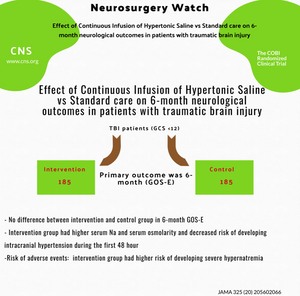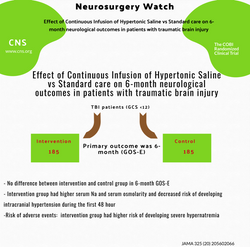Effect of Continuous Infusion of Hypertonic Saline vs Standard care on 6-month neurological outcomes in patients with traumatic brain injury The COBI Randomized Clinical Trial


- Prophylactic continuous infusion of hypertonic saline had been shown in some studies to reduce the risk of intracranial hypertension and improve in-hospital mortality. Long-term outcome data are lacking
- The COBI trial is an open-label, randomized control trial of moderate to severe TBI patients (GCS <12) receiving either continuous hypertonic saline (20% NaCl) initiated within the first 24 hours and maintaining for at least 48 hours or standard of care based on Brain Trauma Foundation guidelines (bolus osmotherapy included)
- Primary outcome was 6-months Glasgow Outcome Scale – Extended (GOS-E) dichotomized as poor (GOS-E 1 to 5) vs favorable (GOS-E 6 to 8).
- 370 patients enrolled, with primary outcome data available for 359 patients
- There was no difference between intervention and control group in 6-months GOS-E.
- Intervention group had significantly higher serum sodium and serum osmolarity and had a reduction in risk of development of intracranial hypertension during the first 48 hours.
- Intracranial hypertension developed in a similar proportion of patients in the intervention and control groups, with evidence of rebound intracranial hypertension more prevalent in the intervention group, occurring from day 4 onward
- Risk of adverse events was similar between the two groups with exception of risk of developing severe hypernatremia, which was higher in the intervention group
Source
JAMA Network